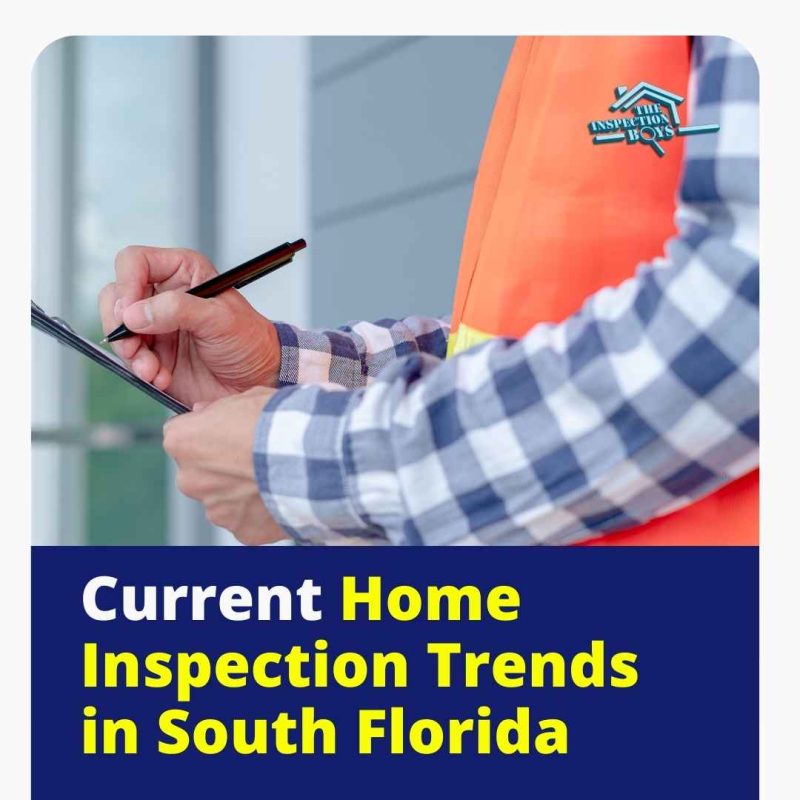South Florida’s real estate market continues to be dynamic, with its warm climate and appealing lifestyle attracting both local and international buyers. However, the region’s unique weather conditions, including high humidity, frequent thunderstorms, and the potential for hurricanes, make home inspections a critical part of the real estate process. In 2024, several key trends are shaping the home inspection landscape in South Florida.
Increased Focus on Roof and Wind Mitigation Inspections
Given South Florida’s vulnerability to hurricanes and tropical storms, there is a growing demand for comprehensive roof and wind mitigation inspections. Homebuyers and owners alike are placing more emphasis on the structural integrity of their roofs, ensuring that they can withstand high winds and severe weather. Inspectors are paying close attention to the age, material, and condition of roofs, as well as the presence of hurricane straps, impact windows, and other wind-resistant features.
In addition, wind mitigation inspections have become a common request due to their ability to lower insurance premiums. These inspections assess a home’s ability to resist wind damage, with homes that feature reinforced roofing, shutters, and storm-proof windows being eligible for discounts.
Energy Efficiency Inspections
With energy costs on the rise, homeowners and buyers are increasingly seeking energy-efficient properties. Inspections are now frequently focused on identifying energy-saving features such as solar panels, energy-efficient windows, and upgraded insulation. Many homebuyers are looking for properties that not only offer lower utility bills but are also environmentally friendly.
Inspectors are now equipped to assess the efficiency of HVAC systems, lighting, and appliances, providing detailed reports that help buyers understand the potential energy savings of a home. This focus on sustainability and energy conservation is a growing trend in the South Florida market.
Moisture and Mold Assessments
South Florida’s humid climate makes homes more susceptible to moisture problems, which can lead to mold growth if not addressed. As a result, moisture and mold assessments have become increasingly common during inspections. Inspectors now use advanced moisture meters and thermal imaging cameras to detect hidden water leaks and areas of high humidity, even if there are no visible signs of mold.
This trend is particularly important for homes that have been exposed to heavy rainfall or flooding, as undetected water damage can lead to costly repairs down the line. Mold assessments are not only crucial for property value but also for health considerations, as mold can trigger respiratory issues and allergies.
Smart Home Technology Inspections
The rise of smart home technology has also impacted the home inspection process in South Florida. Many buyers are now interested in properties equipped with smart security systems, automated thermostats, and energy-efficient appliances. Home inspectors are increasingly required to evaluate these systems, ensuring that they are properly installed and functional.
Smart home technology inspections include checking the integration of devices, network connectivity, and the effectiveness of security systems. This trend is expected to continue growing as more homes adopt smart technology for convenience, energy savings, and security.
Termite and Pest Inspections
Due to the warm, moist climate, South Florida homes are at a higher risk for termite infestations and other pests. Pest and termite inspections are a vital part of the home inspection process in the region. Inspectors are focusing more on detecting the presence of termites, which can cause extensive damage if not treated promptly. These inspections are especially important for older homes with wooden structures, as termites can weaken the foundation over time.
In conclusion, South Florida’s unique climate and real estate market have led to a shift in home inspection trends. Buyers are seeking more detailed and specialized inspections, from energy efficiency and moisture assessments to smart technology and wind mitigation inspections. Staying ahead of these trends can help both homeowners and buyers ensure their properties are safe, sustainable, and ready for South Florida’s dynamic environment.

